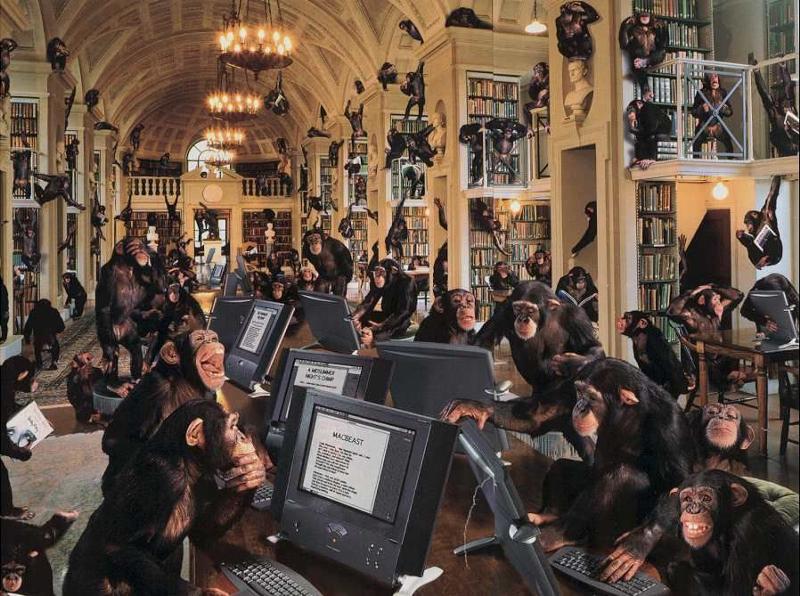
|
|
presents
|

|
The Lounge at Iwan Ries, 19 S. Wabash Av, 2d Floor
Tuesday, February 4, 2020, 5:30-8:30 pm
Cocktails and cigars at 5:30, with the presentation at 6:00 for about 30 minutes.
A mashup of eclectic cocktail conversation follows.
Reservations are required.
|
|
 |
|
You have doubtless heard that six
monkeys typing at random on six
typewriters will eventually type out the
complete works of Shakespeare. How can
this be?
How can it be that a purely random
process could produce something that we know
to require a reading and writing knowledge
of the English language; an understanding of
the structure of a sonnet in terms of meter
and rhyme; knowledge of how dialogs are
constructed and dramatic sequences are
created; and, in the case of the works of
Shakespeare, immense creative genius.
Monkeys typing with purposeless, random
motions could do that? Come on.
And it's not just Shakespeare we're
talking about. In Émile Borel's
original formulation of the Parable of the
Monkeys (1913-14), he imagined that a
million monkeys on a million typewriters
would eventually type out all the books in
the Bibliothèque nationale. (Gilbert Lewis
targeted the library of the British Museum
in 1926, Sir James Jeans targeted the works
of Shakespeare in 1930.)
And it gets worse—or should we say,
gets even more interesting?
It is not only that all existing
pieces of literature would eventually be
typed out, but also everything else that has
been lost or has not already been written.
The true story of all of your boss's secret
affairs, for example, plus all the salacious
stories that are false but still believable,
plus mountains of nonsense.
The Argentine poet and essayist Jorge Luis
Borges enumerated some of these items in his
essay on the related notion of The Total
Library (1939) and in his famous short
story, The Library of Babel (1940):
the detailed history of the future,
Aeschylus's The Egyptians, my dreams
and half-dreams at dawn on August 14, 1934,
the proof of Pierre Fermat's theorem, the
unwritten chapters of Edwin Drood,
those same chapters translated into the
language spoken by the Garamantes, the
paradoxes Berkeley invented concerning Time
but didn't publish, the treatise that Bede
could have written (but did not) on the
mythology of the Saxon people, the lost
books of Tacitus, the true story of your
death. Everything!
In Russell Maloney's short story, Inflexible
Logic, in the New Yorker (1941), his
protagonist Mr. Bainbridge noted that one of
his band of precocious monkeys had typed out
the complete diaries of Samuel Pepys,
including the "naughty passages" omitted
from Bainbridge's own bowdlerized version.
The catch—in Borges's words—is that
"for every sensible line or accurate fact
there would be untold millions of
meaningless cacophonies, verbal farragoes,
and babblings." All the generations of
mankind could pass by—as the mountains of
monkey-generated manuscript obliterated the
sky—before ever being rewarded with a
single, tolerable page. (It seems that
Borges may have prefigured the modern
internet, in some ways.)
This talk will be a brief introduction to
the Parable of the Monkeys and its dual
notion, the Universal Library, in terms of
literature, philosophy, science, and
mathematics.
If you have time before or after the talk,we
recommend these two pieces of short fiction:
Maloney's Inflexible
Logic (1940) and Borges's Library
of Babel (1941).
|
| |

|
Curtis Tuckey
has a PhD in mathematical logic from
the University of Wisconsin and a
bachelor's degree in physics from
Michigan State. He has taught
mathematics and computer science at
Loyola, DePaul, and Northwestern,
and has worked as a researcher and
software engineering manager at Bell
Labs (AT&T), Motorola, and
Oracle. His professional interests
include voice technologies, software
for enterprise collaboration, and
cloud computing. His scholarly
interests include mathematical logic
and its applications, science in
literature, and literate science. |
|
| |
|
About the
Cigar Society of Chicago
ONE OF THE OLDEST AND
greatest traditions of the city clubs of
Chicago is the discussion of intellectual,
social, legal, artistic, historical,
scientific, musical, theatrical, and
philosophical issues in the company of
educated, bright, and appropriately
provocative individuals, all under the
beneficent influence of substantial
amounts of tobacco and spirits. The
Cigar Society of Chicago
embraces this tradition and extends it
with its Informal Smokers, University
Series lectures, and Cigar
Society Dinners, in which cigars,
and from time to time pipes and
cigarettes, appear as an important
component of our version of the classical
symposium. To be included in the
Cigar Society's mailing list, write to the
secretary at
curtis.tuckey@logicophilosophicus.org
|
|
|